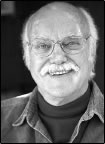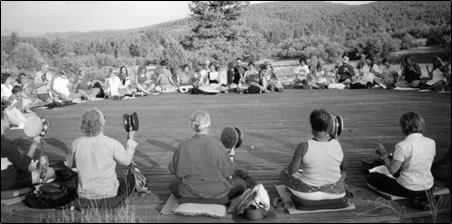|
Renowned spiritualist to make
address at Smiley Theater
written by Jen Reeder
 In
1963, two men became the first Harvard professors in
the school’s history to be fired. They were terminated
because of their controversial studies and experiments
with the hallucinogen LSD. One of them, Timothy Leary,
continued his exploration of the drug and its effect
on the mind until his death in 1996. The other, Richard
Alpert, traveled to India and found a different “map
to the consciousness” through spiritualism and
love and became the teacher Ram Dass, which means “Servant
of God.” In
1963, two men became the first Harvard professors in
the school’s history to be fired. They were terminated
because of their controversial studies and experiments
with the hallucinogen LSD. One of them, Timothy Leary,
continued his exploration of the drug and its effect
on the mind until his death in 1996. The other, Richard
Alpert, traveled to India and found a different “map
to the consciousness” through spiritualism and
love and became the teacher Ram Dass, which means “Servant
of God.”
Now, after decades of service and the publication of
his best-selling book, Be Here Now, Ram Dass is coming
to Durango. He will host an evening of teachings and
musical celebration on Friday, Aug. 15, at the Smiley
Building and will lead a retreat over that weekend
at the Tara Mandala retreat center near Pagosa Springs.
In preparation for his visit, the Abbey Theatre will
re-screen “Fierce Grace,” a documentary
on the life of Ram Dass, on Thursday evening, Aug.
14.
 |
| In addition to an evening of teachings at the
Smiley Theater, Ram Dass will lead a weekend
workshop at Tara Mandala, a 500-acre Buddhist
retreat center nearPagosa Springs./Photo courtesy
Tara Mandala.
|
The appearances are a fund-raiser for Tara Mandala
and Ram Dass, who bequeathed his family inheritance
and has accrued significant medical bills since a stroke
in 1997. Ram Dass said he will discuss his stroke this
weekend and answer any questions presented to him,
just as he did during a recent phone interview from
his home in California.
When asked if he had advice for people whose nontraditional
lifestyles cause conflict with their conservative
families, Ram Dass – who grew up on the East Coast in an
affluent Jewish family – paused before saying, “Turn
inside for advice – not outside.”
As for his own turn inside, he said that psychedelics
changed his way of thinking about many things, including
God.
“
My perception of God when I was bar mitzvahed and so
on was of an old man with a beard. It was very stilted,” he
said. “When I took mushrooms, I was with
God in my heart, not my mind.”
Ram Dass said his life was drastically changed
in 1968 when he met Neem Karoli
Baba, the Hindu
teacher who
gave him his name and told him not to take
his inheritance. Though he doesn’t believe in
labels, Ram Dass does identify with Hinduism as
his primary religion.
“
I take the Hindu view of the world as gospel – there
is One, there are many forms, many paths to the One – heart
paths, mind paths, body paths – and the Hindus
follow all those paths, and gods and goddesses are
doorways toward the One,” he said. “For
example, I worship a monkey, Hanuman, and he’s
the symbol of service as a path to the One.”
Ram Dass said one of the myriad ways he serves
is by staying by the bedsides of dying people.
In fact, he
was with his old friend Timothy Leary when
he died.
“
We stayed friends through all of it,” Ram Dass
said. “We just couldn’t play any games
together because we had opted for different games
on the gameboard.”
Despite his stroke, which left him partially
debilitated, Ram Dass’ sense of humor is alive and well. When
asked if he’s had use for medical marijuana,
he said he had become the poster child for it.
“In fact, it’s made my post-stroke experience much more happy,” he
chuckled. “It makes my pain and my spacisity down to zero – but
then the side effects are like a joint always did.”
In “Fierce Grace” Ram Dass discusses the moment he “got stroked,” stating
that he “flunked the test” because he didn’t have a spiritual
vision but just stared peacefully at the pipes near the ceiling. However,
in hindsight, Ram Dass admits he may have had a catharsis after all.
“
I think now that I didn’t flunk,” he said. “After all, the
fact I was going to die was in the doctors’ minds, and I didn’t have
any feeling that I was going to die. That would have been fueled by processes
of change – looking at the pipes was perfect.”
 |
| Ram Dass’ appearances
this is in the process of building a permanent
temple and community building./ Photo courtesy
of Tara Mandala |
Despite his levity, Ram Dass’ tone did take a serious turn when discussing
environmental activism and the issues facing the planet, such as deforestation,
overpopulation, global warming and pollution.
“
It’s us – we’re the blight,” he said. “And we have
to stop soiling our nest. We’re very, very stupid.”
But when asked if he thinks people are less open-minded or aware
now than they were in the 1960s, he quickly replied: “No. I think the ’60s
are doing well at the moment.”
Despite the shortcomings of the current culture, Ram Dass did noted
there is cause for inspiration all around, including the next generation.
“
For example, I was in Texas the other day, and at the end of lectures I have
a hug line,” Ram Dass said. “There were two adolescents who came
up and said, ‘Man, you are awesome!’ It was the same stuff we were
saying in the ’60s. Those ideas are going on and on and on.”
And so are friendships Ram Dass forged in the ’60s, such as the one
with Tsultrim Allione, founder of Tara Mandala. The two will lead the Smiley
event
and retreat together.
“
We go way back,” said Allione. “I first met him in 1967 when he came
to Nepal with a friend, and they were trying to explore the ‘Mystic East.’”
Allione later traveled in the United States with Ram Dass and Allen
Ginsberg in 1973, when she was the only Tibetan Buddhist nun in the
country. She
also was Ginsberg’s meditation teacher.
“
He took a tremendous interest in whoever he met and wherever he was,” she
said of Ginsberg. “Just a waitress in a restaurant `85 he would really
talk to her and try to learn about her life.”
Allione said she and Ram Dass always stayed in touch, and it will
be special to have him here to support Tara Mandala.
“
I think it’s great that he’s doing it and coming to the area,” she
said.
|

